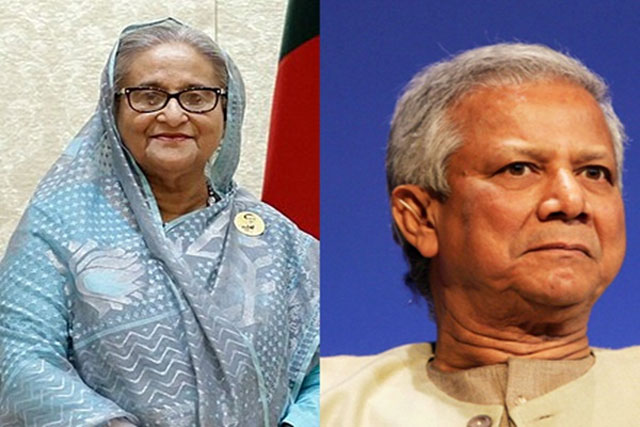Daijiworld Media Network – Dhaka
Dhaka, Nov 17: Former Bangladesh Prime Minister Sheikh Hasina has alleged that the interim government led by Nobel laureate Muhammad Yunus actively enabled widespread attacks against minorities, especially Hindus, forcing thousands to flee their homes. In her first extensive interview with the international media since her ouster last year, Hasina accused the Yunus administration of dismantling Bangladesh’s democratic and secular foundations and pushing the nation toward instability.
Speaking to NDTV’s Aditya Raj Kaul, Hasina described her removal on August 5, 2024, as a “tragic subversion of democracy.” She said the student protests that preceded her departure were hijacked by anti-democratic forces bent on toppling her elected government. As violence spiralled across Dhaka, she said she left the capital to protect her family and avoid further bloodshed.

Hasina condemned the attack on 32 Dhanmondi, the historic residence of her father Sheikh Mujibur Rahman, calling it “a barbaric attempt to erase the legacy of our independence.” She said the vandalisation, allegedly carried out with state backing, was part of a broader effort to undermine the spirit of the Liberation War.
She sharply criticised the delay in national elections, saying the Yunus-led administration was “terrified” of facing voters. Elections expected in February, she warned, would be nothing more than “a charade” that legitimises unconstitutional rule. She also condemned the banning of the Awami League, saying it disenfranchises millions and sets a dangerous precedent.
One of Hasina’s strongest charges was that the interim government permitted, and even encouraged, targeted violence against religious minorities. She said thousands of Hindu families had been attacked, displaced, or forced to flee since the change in power.
“The state has not only failed to protect them; it has actively sanctioned these brutal attacks by denying their very existence,” she said. She added that extremist elements had been empowered within the new administration, including individuals linked to Hizb-ut Tahrir.
Hasina expressed concern that the Yunus regime’s growing engagement with radical factions threatens regional stability. “For decades, our government was successful in containing terror elements. Instead, Yunus has elevated extremists into positions of power,” she said.
Asked about speculation over US involvement in her ouster, Hasina said she had seen “no decisive evidence” of foreign interference. She noted, however, that Yunus had long enjoyed admiration in some Western circles, though his alliance with extremists had eroded much of that goodwill.
Now in India, Hasina thanked New Delhi for offering her refuge, saying the relationship between the two countries is rooted in deep respect and shared regional interests. She stressed that Bangladesh’s political destiny must be shaped by its own people, even as she acknowledged India’s preference for a government in Dhaka that enjoys genuine public support.
Ending on a note of determination, Hasina said she remained confident in the resilience of Bangladeshi citizens. “A stable, democratic Bangladesh benefits us all,” she said. “I believe any country that values democracy will support us in restoring ours.”